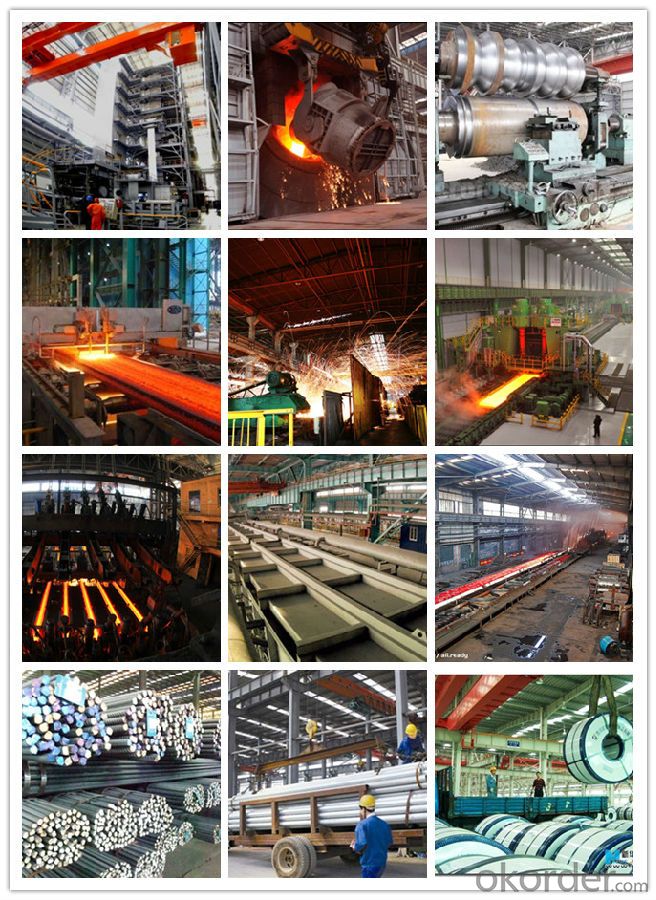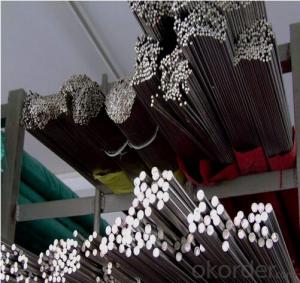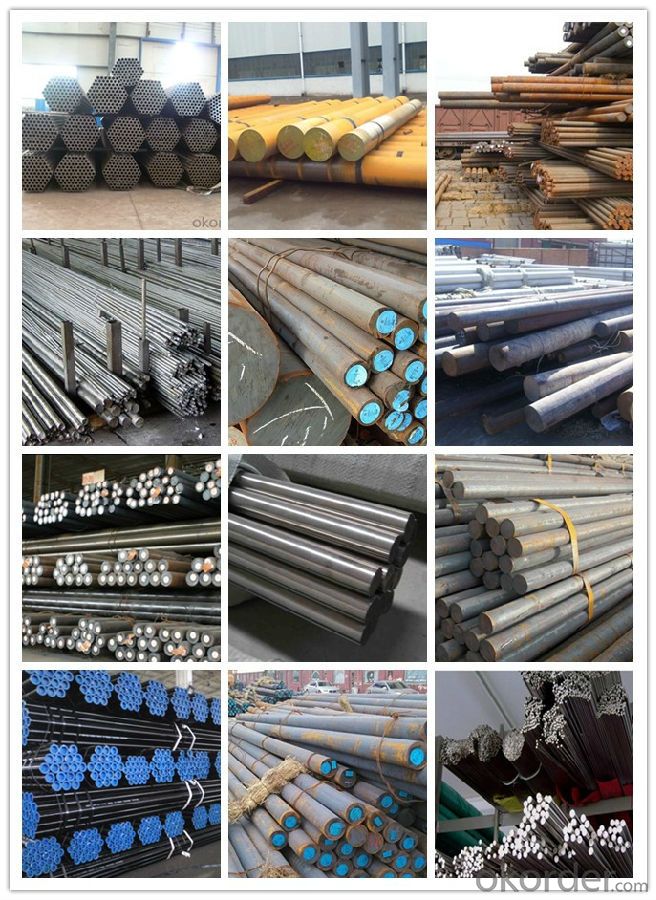Special Steel SAE1020 Alloy Structual Steel Round
- Loading Port:
- China main port
- Payment Terms:
- TT OR LC
- Min Order Qty:
- 30 m.t.
- Supply Capability:
- 10000 m.t./month
OKorder Service Pledge
OKorder Financial Service
You Might Also Like
Item specifice
Product information
Grade: | Carbon or alloy |
Dia.: | 10mm~1200mm |
Length: | Random or fixed as required |
Standard | GB,ASTM,JIS,BS |
Out Side Coating | Bare outside |
Ends | Plain ends with color painting |
Packing | Loose bundle |
Delivery | By container/train/lorry |
Third Party Inspection | SGS/BV/LORDS |
Delivery time | 7 days Min. |
Applications:
1. It is mainly used for manufacture of cold-work dies, punches, cold cutting scissors, drill bushes, gauges, wire-drawing dies, coining dies, draw bench boards, drawing dies, thread rolling dies, etc. with high abrasive resistance and small shock load.
2. It is used for processing of cutters made of materials which are not hard.
3. It is used for plastic moulds with high abrasive resistance and long service life.
Product show
Workshop show

Shipping
1. FedEx/DHL/UPS/TNT for samples, Door-to-Door;
2. By Air or by Sea for batch goods, for FCL; Airport/ Port receiving;
3. Customers specifying freight forwarders or negotiable shipping methods!
Delivery Time: 3-7 days for samples; 5-25 days for batch goods.
Payment Terms
1.Payment: T/T, L/C, Western Union, MoneyGram,PayPal; 30% deposits; 70% balance before delivery.
2.MOQ: 1pcs
3.Warranty : 3 years
4.Package Informations: 1) EXPORT, In 20 feet (GW 25 ton) or 40 feet Container (GW 25 ton)
2)as customer's requirement
Why choose us?
(1) The leading exporter in China special steel industry.
(2) Large stocks for various sizes, fast delivery date.
(3) Good business relationship with China famous factories.
(4) More than 7 years steel exporting experience.
(5) Good after-sales service guarantee.
- Q:What are the common defects found in special steel production?
- Various defects can be found in the production of special steel, including the following: 1. Inclusions: Impurities or foreign materials can become trapped in the steel during manufacturing, weakening its strength and overall quality. 2. Segregation: Uneven distribution of elements within the steel can occur due to fluctuations in temperature or composition during production. This can lead to inconsistencies in mechanical properties and reduce reliability. 3. Cracks: Improper cooling or excessive stress during manufacturing can cause cracks in the steel, significantly compromising its strength and making it more vulnerable to failure. 4. Decarburization: The surface of the steel can lose carbon when exposed to high temperatures or oxidizing environments, resulting in decreased hardness and strength. 5. Laminations: Improper rolling or forging techniques can cause layered sheets to form within the steel, weakening its structure and potentially causing failure under stress. 6. Dimensional variations: Precise control of dimensions is crucial in special steel production, but inconsistencies in cooling or machining can lead to variations that affect fit, function, and overall performance. 7. Non-uniform microstructure: Inconsistent cooling rates or other processing factors can result in a non-uniform microstructure in the steel, causing variations in hardness, strength, and other mechanical properties that impact overall quality. Manufacturers must implement rigorous quality control measures to detect and minimize these defects during special steel production. Regular inspections, testing, and adherence to industry standards are essential to ensure that the final product meets desired specifications and is free from common defects.
- Q:Can special steel be heat treated?
- Yes, special steel can be heat treated. Heat treatment is a common process used to enhance the properties and performance of steel, including special steel. It involves heating the steel to a specific temperature and then cooling it rapidly or slowly to achieve desired characteristics such as increased hardness, improved strength, or better resistance to wear and corrosion.
- Q:What are the different impact-resistant grades of special steel?
- Steel alloys known as impact-resistant grades are designed to withstand high impact and shock loads without fracturing or deforming. These grades of steel are crucial in industries like construction, mining, automotive, and defense, where resistance to impact and toughness are essential. Numerous impact-resistant grades of special steel are available, each with its own unique characteristics and properties. Some commonly used grades include: 1. AR400: This steel has a hardness of 400 Brinell (HB) and is highly resistant to abrasion and impact. It finds applications in bucket liners, crushers, and hoppers where wear resistance is critical. 2. AR500: With a hardness of 500 HB, AR500 steel offers even greater resistance to wear and impact compared to AR400. It is frequently used in heavy machinery, mining equipment, and armored vehicles. 3. AR600: This steel boasts a hardness of 600 HB, making it one of the toughest and most impact-resistant options. It is ideal for applications that require extreme wear resistance and durability, such as chutes, conveyors, and ballistic protection. 4. T-1: T-1 steel is a high-strength, low-alloy (HSLA) steel that delivers excellent impact resistance and toughness. It is commonly utilized in structural components, heavy equipment, and offshore drilling rigs, where high strength and toughness are essential. 5. QT or Quenched and Tempered Steels: These steels undergo specific heat treatment to enhance their toughness and impact resistance. They are popular in applications that demand high strength, toughness, and impact resistance, such as gears, shafts, and armor plates. It is important to note that the impact resistance of a specific steel grade depends not only on its composition but also on factors like heat treatment, fabrication techniques, and design considerations. Therefore, consulting steel manufacturers or experts is crucial in determining the most suitable impact-resistant grade for a particular application.
- Q:What are the requirements for special steel used in aircraft manufacturing?
- The requirements for special steel used in aircraft manufacturing are quite stringent due to the critical nature of the components and the demanding operating conditions in which they are subjected. Here are some key requirements: 1. High strength: Special steel used in aircraft manufacturing must possess exceptional strength to withstand the extreme forces and loads experienced during flight. This ensures the structural integrity and safety of the aircraft. 2. Lightweight: While strength is crucial, special steel for aircraft must also be lightweight to minimize the overall weight of the aircraft. This helps enhance fuel efficiency and allows for increased payload capacity. 3. Corrosion resistance: The steel must exhibit excellent resistance to corrosion, as aircraft are often exposed to harsh environments, including high humidity, saltwater, and various chemicals. Corrosion resistance helps maintain the structural integrity and prolong the lifespan of the aircraft. 4. Fatigue resistance: Special steel must have high fatigue resistance to withstand repetitive loading and unloading cycles that occur during flight. This ensures that the components do not fail prematurely due to cyclic stress. 5. Heat resistance: The steel should be able to withstand high temperatures generated by the engines, as well as the heat generated during high-speed flight. Heat resistance prevents deformation, melting, or loss of strength under extreme thermal conditions. 6. Weldability: Special steel used in aircraft manufacturing should possess good weldability, allowing for efficient and reliable joining of components during the manufacturing process. This ensures strong and secure connections between various parts of the aircraft. 7. Non-magnetic properties: In certain applications, such as electronic systems, it is essential for the steel to be non-magnetic to prevent interference with sensitive equipment. 8. Traceability and certification: The steel must have proper traceability and certification to meet industry standards and regulatory requirements. This includes documentation of the steel's composition, manufacturing process, and testing procedures to ensure consistent quality and performance. Meeting these requirements is essential to ensure the safety, reliability, and efficiency of aircraft. Special steel used in aircraft manufacturing undergoes rigorous testing, quality control, and certification processes to ensure it meets these stringent requirements before being used in the construction of aircraft components.
- Q:How is corrosion-resistant stainless tool steel used in the production of food processing equipment?
- Corrosion-resistant stainless tool steel is used in the production of food processing equipment because it offers a high level of resistance against chemical reactions, rust, and staining caused by exposure to moisture and food acids. This type of steel helps ensure that the equipment remains durable, hygienic, and safe for food processing operations.
- Q:What is the impact of impurities on the properties of special steel?
- The presence of impurities in special steel can have a significant impact on its properties. Impurities can weaken the steel's structural integrity, reduce its mechanical strength, and compromise its corrosion resistance. High levels of impurities can also affect the steel's ability to be fabricated or shaped into desired forms. Therefore, it is crucial to minimize impurities during the manufacturing process to ensure that special steel maintains its desired properties and performance characteristics.
- Q:What are the different methods of surface peening for special steel?
- To enhance the mechanical properties of special steels, surface peening is employed to induce compressive stresses on the surface. This process helps improve fatigue life, resistance to stress corrosion cracking, and overall durability. Various methods of surface peening exist for special steel, including: 1. Shot Peening: This technique involves bombarding the steel surface with high-velocity spherical particles, known as shot. The impact of these particles induces plastic deformation and creates compressive stresses. Shot peening is widely used due to its effectiveness in improving fatigue life. 2. Ultrasonic Peening: Compressive stresses are induced on the steel surface using high-frequency vibrations in ultrasonic peening. These vibrations are applied through a tool in contact with the surface, leading to plastic deformation and the generation of compressive stresses. 3. Laser Peening: A high-energy laser beam is utilized in laser peening to create shockwaves on the steel surface. These shockwaves induce plastic deformation and generate compressive stresses. Laser peening is known for its precision and ability to target specific areas. 4. Cavitation Peening: By creating cavitation bubbles near the steel surface in a liquid medium, cavitation peening induces compressive stresses. The collapse of these bubbles generates high-intensity shockwaves. This method is particularly beneficial for irregularly shaped components. 5. Needle Peening: In needle peening, a bundle of fine needles is repeatedly impacted on the steel surface. This process induces plastic deformation and generates compressive stresses. Needle peening is commonly used for localized treatment of small areas. Each of these methods offers unique advantages and is suitable for specific applications. The selection of the surface peening method depends on factors like the type of special steel, component geometry, desired improvements, and available equipment. It is crucial to consider the specific requirements and seek expert advice to determine the most appropriate method for surface peening special steel.
- Q:What are the requirements for special steel used in mining equipment?
- Special steel used in mining equipment needs to possess certain key requirements. Firstly, it must have high strength and toughness to withstand the harsh and demanding conditions present in mining operations. It should also exhibit excellent wear resistance to endure the abrasive nature of rocks and minerals. Additionally, corrosion resistance is crucial to prevent the steel from deteriorating due to exposure to water, chemicals, and other corrosive substances commonly found in mining environments. Finally, the special steel used in mining equipment should be capable of maintaining its mechanical properties at elevated temperatures, as mining processes often involve high heat generation. Overall, the requirements for special steel in mining equipment revolve around durability, wear resistance, corrosion resistance, and heat resistance.
- Q:How is stainless steel used in the production of kitchen utensils?
- Stainless steel is commonly used in the production of kitchen utensils due to its durability, corrosion resistance, and aesthetic appeal. It is used to make various utensils such as knives, forks, spoons, pots, pans, and cooking tools. The stainless steel material ensures that these utensils can withstand frequent use, resist rust and staining, and are easy to clean, making them ideal for use in the kitchen.
- Q:What are the different testing methods used for special steel?
- There are several testing methods commonly used for special steel, including mechanical testing, non-destructive testing (NDT), and chemical analysis. Mechanical testing involves evaluating the physical properties of the steel, such as tensile strength, hardness, and impact resistance. NDT methods, such as ultrasonic testing, magnetic particle inspection, and radiographic testing, are used to detect defects or flaws in the steel without causing any damage. Chemical analysis involves determining the composition and elemental content of the steel, which is crucial for ensuring its quality and performance. These testing methods are essential in ensuring the reliability and suitability of special steel for various applications.
1. Manufacturer Overview |
|
|---|---|
| Location | |
| Year Established | |
| Annual Output Value | |
| Main Markets | |
| Company Certifications | |
2. Manufacturer Certificates |
|
|---|---|
| a) Certification Name | |
| Range | |
| Reference | |
| Validity Period | |
3. Manufacturer Capability |
|
|---|---|
| a)Trade Capacity | |
| Nearest Port | |
| Export Percentage | |
| No.of Employees in Trade Department | |
| Language Spoken: | |
| b)Factory Information | |
| Factory Size: | |
| No. of Production Lines | |
| Contract Manufacturing | |
| Product Price Range | |
Send your message to us
Special Steel SAE1020 Alloy Structual Steel Round
- Loading Port:
- China main port
- Payment Terms:
- TT OR LC
- Min Order Qty:
- 30 m.t.
- Supply Capability:
- 10000 m.t./month
OKorder Service Pledge
OKorder Financial Service
Similar products
New products
Hot products
Related keywords































